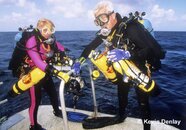There is risk in any type of diving (as well as most other human activities) but not all risks are the same:
It’s very easy to mix and match all these different types of risk and try to justify one with another but we should acknowledge what is an objective risk and how/if can be mitigated.
- Tec diving is riskier than rec diving because it involves dives with higher exposure (depth, time, overhead) that require decompression and navigation procedures and often has mixes to safely return to the surface, ie more complex and hence with higher risk. This risk can be managed (not eliminated) with proper training, equipment, and procedures.
- Deep diving with wrong gases (eg deep air) is riskier than shallow diving or deep diving with proper mixes because of physiology and physics — this is why it’s frowned upon based on the last 50 years of research. It cannot be mitigated. It varies between individuals based on their own physiology and fitness.
- CC diving is more complex than OC hence could be more risky, however in my opinion is less risky in highly complex dives (very deep, overhead) because it gives more time which is critical for problem solving.
It’s very easy to mix and match all these different types of risk and try to justify one with another but we should acknowledge what is an objective risk and how/if can be mitigated.





